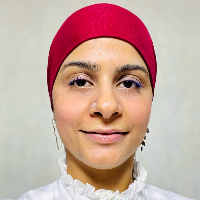ICDB 2025

Expressive Selfcare, India
Abstract:
In May 2019, I
began a full-time role at a hospital's Department of Physiotherapy and
Rehabilitation to introduce movement-based expressive arts therapy
into neurological rehabilitation. My objective was to demonstrate the effectiveness of the Tamalpa
Life/Art Process®, a creative methodology that promotes neuroplasticity and fosters resilience and recovery. This five-part process—identification, confrontation, release, change, and growth—utilises various
art mediums to explore patients'
physical, emotional, and mental experiences. During my
tenure, I collaborated closely with medical professionals and patients,
observing therapy sessions and
identifying opportunities to integrate expressive arts. The approach includes
techniques such as movement,
drawing, writing, music, and dialogue, helping patients express and process
their needs nonverbally. The use of body part metaphors allows for a deeper exploration of personal stories
and recovery goals.
The
integration of this methodology with traditional medical treatments has shown
promising results in providing a holistic
framework for neurological rehabilitation. This proposal
outlines the continuation and expansion
of this work, with case studies highlighting its impact on patients recovering
from strokes, road traffic accidents,
and post-COVID neurological challenges. By fostering a deeper understanding of self through creative
expression, this approach
aims to enhance
patients' resilience and overall recovery
Biography:
Sophia Ali is a practising psychotherapist from India with a Master's degree in Clinical Psychology and specialized training in Movement-Based Expressive Arts Therapy from the Tamalpa Institute in California, USA. She is India's first Tamalpa Practitioner and is registered as a Registered Somatic Movement Therapist (RSMT) and Registered Somatic Movement Educator (RSME) with the International Somatic Movement Education & Therapy Association (ISMETA). Since 2016, she has been dedicated to her practice and currently serves as a consultant psychotherapist at the International Pain Centre. There, she conducts individual therapy for a diverse range of clients, focusing on providing tailored therapeutic support to help individuals navigate their challenges and improve their overall well-being
